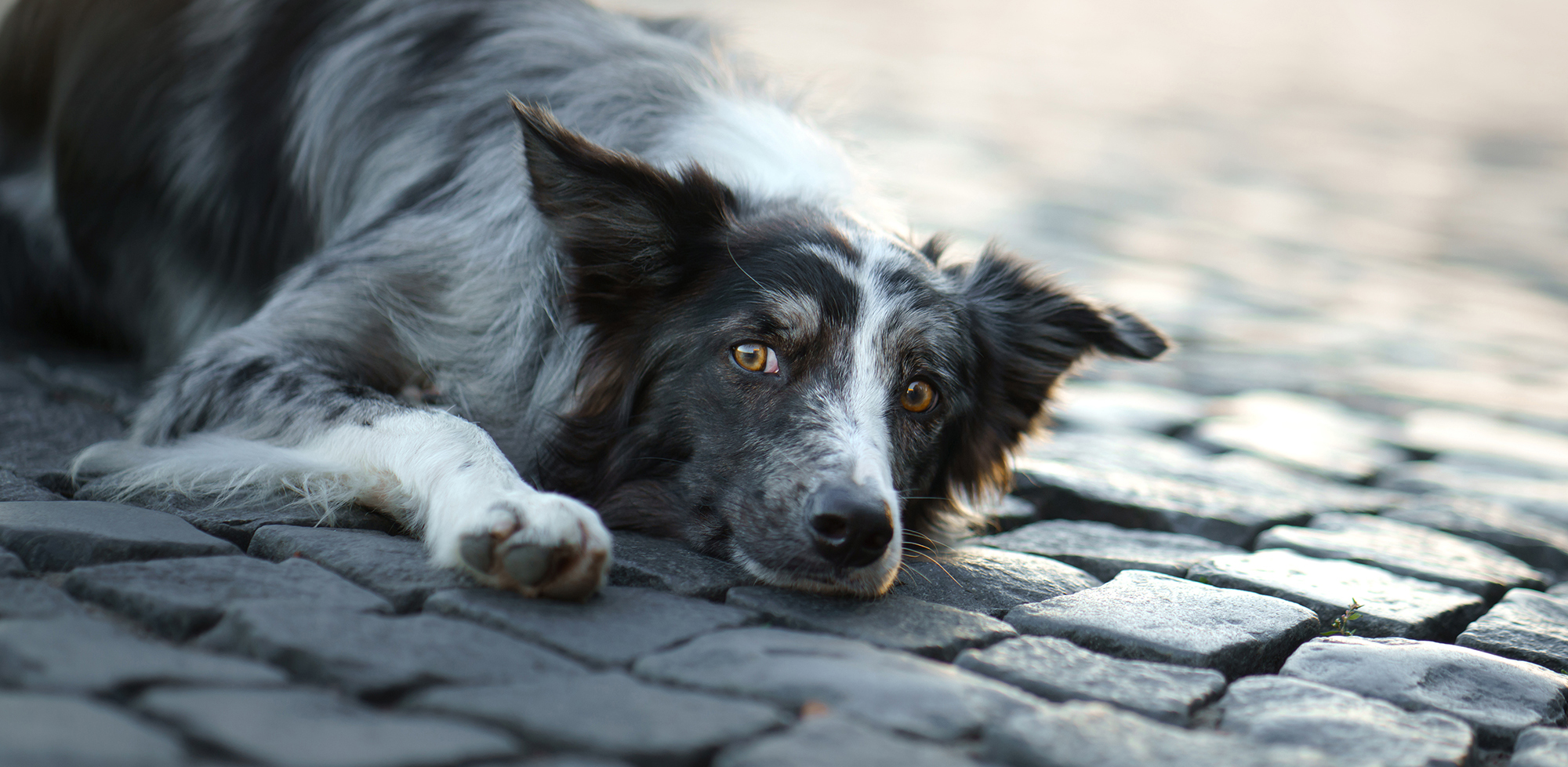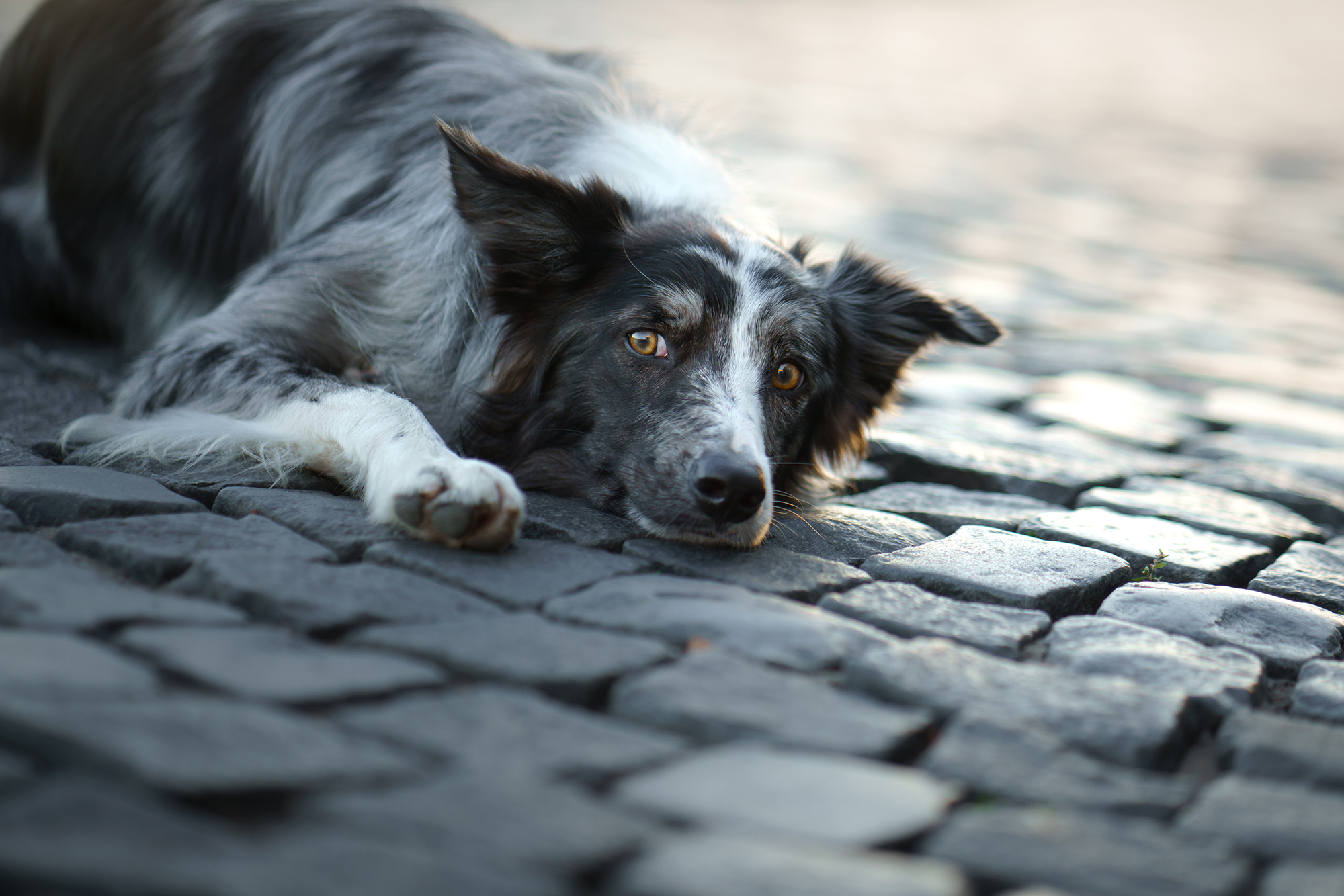
If so, you’re not alone. This is probably the number one issue that border collie puppy owners report and it can cause a lot of anxiety, ruined walks and it’s an extremely unsafe situation for dog, handler and other road users. It therefore needs nipping in the bud the moment it starts.
What causes border collies to chase vehicles?
Border collies have been selectively bred for hundreds of years to be good at what they do. In order to herd sheep, they need to be extremely sensitive to movement, able to spot sheep on the hills, sometimes from over a mile away, and react to the slightest small movement that sheep make while moving them. The dogs that weren’t able to do their job well weren’t bred from. This means that we have purposely been breeding dogs that look for moving objects to herd from any distance.
Alongside this breeding, most border collies, particularly those from working lines, live their lives on remote farms, away from lots of people and traffic. Their longing to herd any moving object isn’t a problem on these farms. They are used to a quiet life. In recent times border collies have become much more popular as pets and are being taken to live in cities and towns. Their border collie brains are completely overwhelmed and they really struggle to cope in this new environment. Part of them wants to chase but part of them is either completely terrified or completely over-excited depending on the personality of the dog. Either way, it’s not nice for them and they would much rather it wasn’t happening!
Also bear in mind what is happening in the puppy’s head when he chases a car: the car approaches, he lunges at it to scare it, the car goes away. He has beaten the car. In his head he scared the car off and it went away. This is a big incentive to keep lunging and overrides anything you can do or say to stop it. Shouting at him, physically correcting him, yanking him with the lead will have no effect and will just serve to make him even more scared and/or excited, making the situation worse.
Prevention is way better than cure
Once border collie car chasing has started and it has turned into a habit, it’s VERY difficult to stop the behaviour. It’s not impossible but it takes a lot of hard work and training, it takes a long time and this isn’t the focus of this article. Many people just give up and try and manage it.
Fortunately, it’s relatively easy to prevent.
How to prevent border collie car chasing
Be aware of how your border collie feels about movement and being overwhelmed by noise, traffic, and people. Many are completely terrified, most are fearful. Never just take your new puppy or youngster to a crowded place or a busy main road. Build up gradually. Start with these things at a distance and watch your puppy’s reaction carefully. If they are watching the cars going past and you can’t break their attention to give a treat or play with a toy, then you are too close. Move further away. Drop some treats on the ground so that they build up a positive association with traffic noise rather than a fear reaction. The aim is for the puppy to be completely comfortable around traffic and not pay it any special extra attention.
Once you have the calm reaction you are after, move a little closer. Watch the puppy’s reaction again. Progressing at this pace is ideal and will build up a positive association with the traffic sights and noises.
If your puppy is extremely drawn towards traffic and you live on a main road and are unable to escape the sights and noise when you need to walk them, then you only really have a few options:
Manage the problem:
- Take them out of the town to a quiet place in the countryside well away from traffic and walk them there. Or don’t walk them every day. Play scent games in the house instead, play hide and seek in the garden, train them – do anything that tires them mentally as well as physically. Young puppies need very little walking every day. If you don’t drive then it’s important to continue socialising the puppy to other people, dogs, etc but have them come to the house so that you don’t have to walk there or ask a friend or relative to drive you somewhere quiet away from fast moving vehicles.
- Walk late at night or early in the morning when the traffic volume is much less and have somewhere where you can get right away from the road if a car comes. Even one or two incidents of the puppy starting to chase or lunge can start to form a habit. If this happens every day then you will be stuck with a dog that lunges at cars. NEVER let it happen.
Build up a positive association
Desensitise your dog to the traffic sights, sounds and smells by starting at a distance away, monitoring body language and moving in gradually. At the same time, deliver really high value treats to build up a positive association. If the dog won’t take the treats, you are too close to either the traffic or something else that the dog finds too stressful or exciting. Move further away where there are fewer distractions and start again.
Even training to stop the behaviour will involve keeping the dog away from traffic during the training period. It’s imperative that you keep them away at a distance at which they can cope and start to build up the distance gradually as outlined above.
What about unexpected events?
If you are faced with the occasional situation where you can’t help but have your dog close to traffic, for instance, If you take your dog on vacation to a location where there is a lot of traffic or it’s unavoidable when visiting the vet, take steps to manage the situation (see below) and try not to repeat it. For example, visit at a different time of day when it’s quieter.
Managing border collie car chasing tendencies during unexpected events
If the puppy’s reaction is fearful or he is overexcited, keep him as far away from the traffic as possible. A big scare by loud, close traffic can be enough to trigger car chasing in a pup that has never shown any signs before.
If this isn’t possible, and it isn’t always, then have lots of VERY high value treats with you, such as sausage, cheese, bits of chicken and drip feed the puppy treats right from when they first notice each vehicle to when it has gone. Try and keep their attention on you. This will help to change the association from one of fear/overexcitement to a positive association, linked to calmer behaviour with the focus on you and the food rather than the moving, noisy traffic.
Move away from the traffic as soon as possible. Stand behind things to block his view of the traffic, move down a side street, get him away from there and make plans to not repeat the situation.
How long does this last?
Once the dog is about two years old, if he hasn’t been allowed to practise the behaviour, there is less chance of border collie car chasing becoming a habit so you will be able to gradually introduce him to traffic without him being completely overwhelmed and resorting to lunging or chasing.
So it’s not a case of always having to avoid everything throughout the dog’s life. Get him through the first 18 months to 2 years and things become a lot easier. Invest the time and training and you will have a wonderful dog for life!


Tha k you for this valuable information we shall try our best to follow your tips whatever or however long it takes we love our boy and want to give him the best life we can
Good luck Jane.
Sounds like my border collie pup.12months old. Struggling at the moment. Very good advice. Gives me more hope, and guidance. Thank you
Hi Carol, you’re welcome – hope it helps!
Sounds exactly like my 19 week old border collie puppy. When we take her dinner out in her kong and sit on a bench near the main road outside our house, she’s fine with cars going past. Any other ‘high value’ treat, she’s not bothered about and will continue to lunge for cars. She barks, whimpers and shakes at cars and it’s really difficult to try and calm her. Hopefully the points that have been made can help her in some sort of way, luckily we have lots of countryside walks near us 😊
Hi Courtney, yes, it sounds like you’re sitting too close – try and find somewhere where she is much further away for now. Good luck!